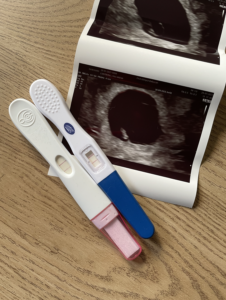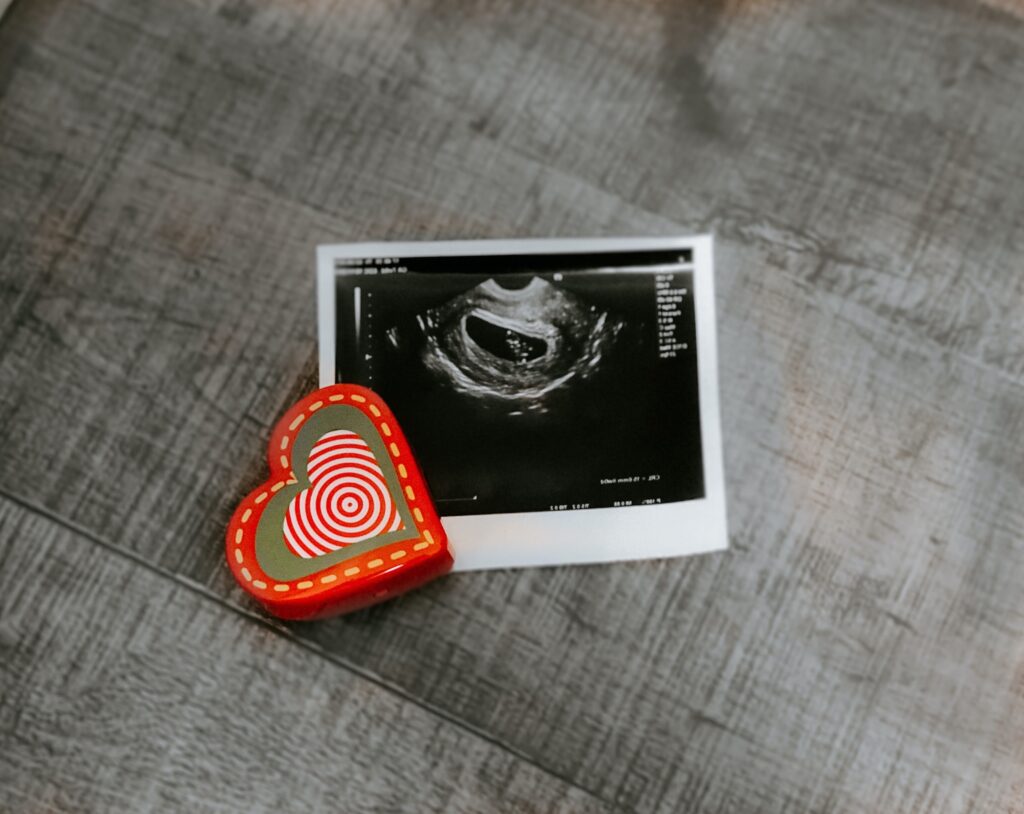I want to share with you my experience with the first ultrasound and offer some valuable insights on how to prepare yourself. As soon as I found out I was pregnant, a whirlwind of emotions took over me. Excitement, anticipation and a touch of nervousness filled my thoughts (I wasn’t expecting it at all!). Amidst all these feelings, one event stood out as a significant milestone in my pregnancy journey—the first ultrasound.
The first scan is an important milestone because up until that point probably the only thing that really indicates that you are pregnant is the positive test, which is basically a peed stick.
The thought of seeing my little one on the screen, hearing the heartbeat and getting a glimpse into the magical world within me was both thrilling and overwhelming.
Understanding the Importance of the First Ultrasound
The first ultrasound during pregnancy is a crucial step in monitoring the development and well-being of your baby. It allows healthcare professionals to confirm the pregnancy, determine the gestational age and check for any potential complications. The ultrasound provides a window into the womb, offering a visual representation of your baby’s growth and ensuring everything is progressing as it should.
The purpose of the dating scan is to determine the gestational age of the baby and estimate the due date. It also helps healthcare professionals identify multiple pregnancies (such as twins or triplets) and check for any early signs of potential complications.
In the United Kingdom, the first ultrasound scan, known as the dating scan or booking scan, is typically recommended to be done between 8 and 14 weeks of pregnancy. However, it is most commonly scheduled around 8 to 12 weeks. The timing of the scan may vary depending on your specific circumstances, availability of appointments and the policies of the healthcare provider or hospital you visit.
If you are like me and don’t want to wait that long, there are private alternatives for the first scan, which you can attend from around 5 weeks.
To calculate your weeks you need to take into account the first day of your last period. This will give you the number of gestational weeks to start planning. Here is a link so you can calculate it.
Educate Yourself
Before going for your first ultrasound, it’s essential to gather information about the process and what to expect. Educate yourself on the purpose of the ultrasound, how it is conducted and the different types of ultrasound scans available. Reliable sources like the NHS can provide valuable insights into the process and its significance.
Communicate with Your Healthcare Provider
Reach out to your healthcare provider and discuss any concerns or questions you may have about the first ultrasound. They can provide specific guidelines and instructions based on your individual needs. It’s important to follow their advice regarding timing, preparation and any dietary or hydration requirements before the ultrasound.
Especially if you are a first-timer, don’t be afraid to ask all the questions you need to know. Here in the UK midwives usually take care of almost the whole process and they are very friendly and helpful.
Stay Hydrated
For many women, having a full bladder is necessary to obtain clearer images during the ultrasound. Follow the instructions provided by your healthcare provider on how much water to drink and when to drink it. Adequate hydration can help ensure a successful and informative ultrasound experience.
Dress Comfortably
On the day of the ultrasound, wear loose and comfortable clothing. This will not only help you relax but also make it easier for the technician to access the necessary areas for the scan.
Bring Support
The first ultrasound is an emotional moment for parents-to-be. Consider bringing your partner, a family member, or a close friend along for support. Sharing this joyous experience with someone close can make it even more special.
Embrace the Moment
When the time comes for your first ultrasound, take a deep breath and embrace the moment. Allow yourself to be in awe as you see your baby’s tiny form on the screen, listen to the rhythmic sound of their heartbeat and witness the miracle of life unfolding before your eyes.
Personally, what surprised me the most during the first scan was seeing the heart beating (I was 6 weeks pregnant). I don’t know what I was expecting, but seeing the heart of this little being was definitely not on the list.
So when to share the news?

 The announcement of your pregnancy is a significant milestone, and sharing the news should be a reflection of your personal preferences and what feels right for you. Whether it’s an intimate and private moment or a grand celebration, the goal is to communicate your joy and excitement to your loved ones while creating memories that will be cherished for years to come.
The announcement of your pregnancy is a significant milestone, and sharing the news should be a reflection of your personal preferences and what feels right for you. Whether it’s an intimate and private moment or a grand celebration, the goal is to communicate your joy and excitement to your loved ones while creating memories that will be cherished for years to come.
In my case, as it was a surprise, I shared the news with my partner, my parents and my best friend on the day of the positive test. After the first scan (at 6 weeks), I told more people (still people very close to me).
But as I mentioned before, it is a very personal thing and you just have to follow your instinct and your heart. It’s a beautiful moment and it’s okay to want to share the excitement, just as it’s okay to wait. It’s just up to you (and your partner)! Don’t listen to other opinions, do what makes sense to you.
To finish, the first ultrasound in pregnancy is a milestone event that holds great significance for expectant parents. By preparing yourself both mentally and physically, you can make the most of this extraordinary experience. Remember to stay informed, communicate with your healthcare provider, and embrace the joy and wonder that the first ultrasound brings. Cherish this magical moment as you embark on the incredible journey of parenthood.
Now that you know a little more about the first scan, I invite you to discover the world of hormones during pregnancy on this blog!
(Note: The information provided in this article is based on personal experience and general knowledge. Always consult with your healthcare provider for specific advice and guidance regarding your pregnancy and ultrasound preparation.)

